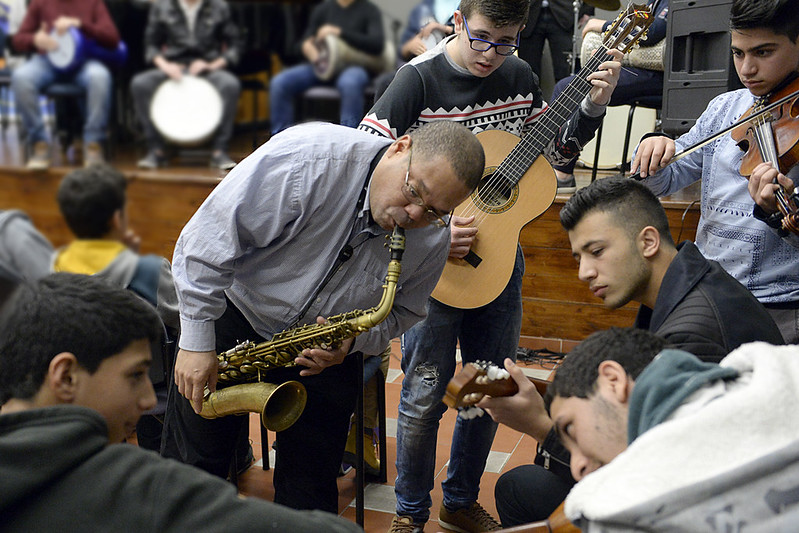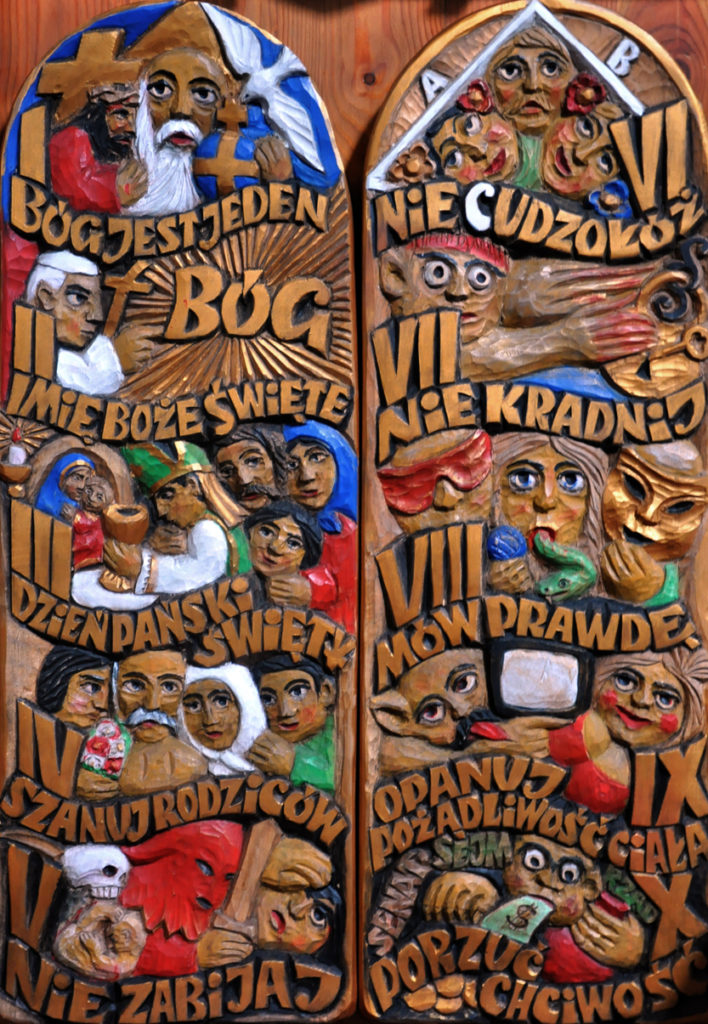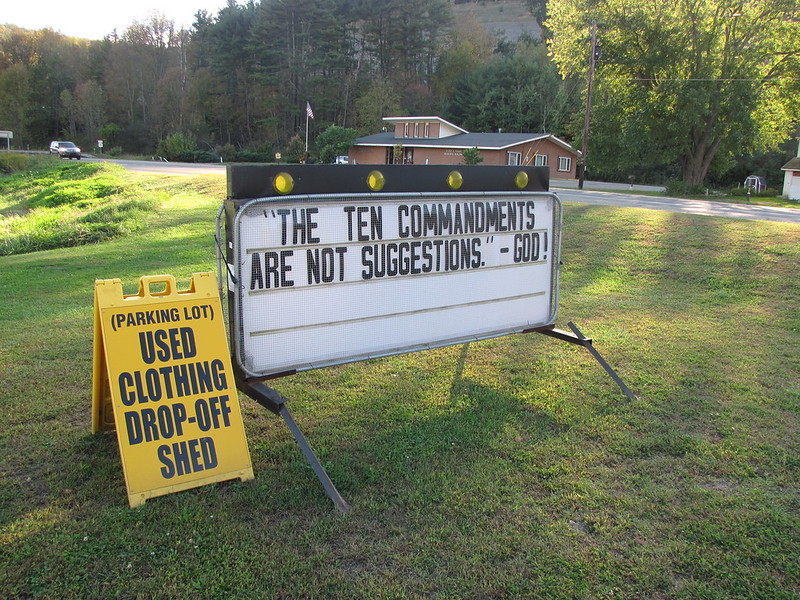Revised Common Lectionary Reflection, Seventeenth Sunday after Pentecost, Year A
October 4, 2020
Lessons: Isaiah 5:1-7; Psalm 80:7-15; Philippians 3:4b-14; Matthew 21:33-46

Theme: God’s faithful and generous people take seriously God’s instructions in the Decalogue, or Ten Commandments, so much so that it affects all areas of life and every relationship.
Key Scripture: Moses said to the people, “Do not be afraid; for God has come only to test you and to put the fear of him upon you so that you do not sin.”– Exodus 20:20
This week’s lessons have a lot to say about relationships, leadership, discipleship, and community. Jesus takes words from the Old Testament lesson (Isaiah 5:1-7) and puts a fresh spin on them in the gospel lesson (Matthew 21:33-46). Check out our 2017 reflection for ideas if you’re using the gospel. Do, however, make the connection between God’s words spoken through the prophet and Jesus’ way of convicting the religious leaders of the day. Kind of makes you wonder what he might say to us today, doesn’t it?
In the epistle lesson (Philippians 3:4b-14) Paul makes the case that there is no other relationship more important than one’s relationship with the Christ. He does it in typical Paul fashion by citing his impressive birthright as a Jew of the tribe of Benjamin and a Pharisee. What may sound like bombast is quickly brushed aside for what really matters. This is the defining relationship and goal of Paul’s life, something he makes clear in verse 14: “I press on toward the goal for the prize of the heavenly call of God in Christ Jesus.” Once again, the idea of relationship within the covenant community of Christ followers is a key element to be explored. Can we say with Paul’s confidence the same sort of thing about exactly how important Jesus is in our own lives today? More telling is how we answer this question: Do we live like it?
Perhaps this is a good Sunday to turn to the alternate Old Testament lesson (Exodus 20:1-4, 7-9, 12-20), where God gives Moses words to describe how the people are to live in relationship with the Holy One and with one another. Many worshipers will remember these instructions for living from Sunday school or Catechism classes. We see them displayed prominently in public buildings such as courthouses. But do we live them? Really live them?

Ten Commandments, illustrative wood relief carving, from Art in the Christian Tradition, a project of the Vanderbilt Divinity Library, Nashville, TN. http://diglib.library.vanderbilt.edu/act-imagelink.pl?RC=55124 [retrieved September 29, 2020]. Original source: http://www.flickr.com/photos/feargal/5096148585/.
It’s mighty tough for contemporary North American Christians to get beyond the first instruction: “you shall have no other gods before me.” An honest ask reveals any number of other gods—sports teams, money, status, careers, hobbies, political party affiliations, and so on and so on. None of these things in and of themselves is evil; it’s all in how we approach them. Any time we say “Not today, Jesus. I have more important things to do than to spend time with you” we place another god between the Creator of the cosmos and us. All of us, at one point or another in our lives (or regularly), allow a “god” or two or more to come between God and us. One classic definition of sin is anything that separates us from the one true God; so it follows that these other “gods” are sin at work in our lives.
Trying to fit the entire Decalogue into a typical sermon is probably not the best approach, but how about setting the stage for either a sermon series or a faith learning series. Don’t worry if you depart from the Lectionary. My experience is that the Spirit provides a context that will support an effort like this so that you could explore in greater depth one or more commandments over the course of several weeks. Even a three part series: this week an introduction and context setting, next week the commandments that define our covenant relationship with God, and the third week the commandments that define our relationship with one another in the light of the covenant with God. Verse 20:16 is especially timely right now: “You shall not bear false witness against your neighbor.” Pair that with Luther’s explication from the Small Catechism: “What does this mean? We should fear and love God that we may not deceitfully belie, betray, slander, nor defame our neighbor, but defend him, speak well of him, and put the best construction on everything.”

A little refresher course in faith basics is always appropriate, especially in these divisive times. Offering a fresh view of beloved community in light of our baptismal covenant is spot on. As Moses said, “Don’t be afraid.” God desires relationship with us and provides good guidance to gather healthy, holy, and whole communities. Blessings on your faithful and prophetic teaching and preaching!
In
Worship
Here’s a wonderful hymn from the Iona Community that speaks
beautifully to this time of pandemic and division.
The text is by Hans-Olav Moerk and John L. Bell, and music by John L. Bell. You can download a copy of the text and music from https://iona.org.uk/2020/06/27/sunday…
At present permission is given for ‘We will meet’ to be used in local church worship and non-commercial situations free of charge, but it cannot be copied or published for commercial use without permission of the copyright holders: Words copyright © 2020 Hans-Olav Moerk and WGRG, c/o Iona Community, Glasgow, Scotland Music copyright © 2020 WGRG, c/o Iona Community, Glasgow, Scotland www.wildgoose.scot If you hold a licence with CCLI or One License, please report any usage of the song.
With
Youth
Invite youth to look at the Ten Commandments with fresh eyes. Consider using
Luther’s explication from the Small Catechism. What might Luther have added if
he was commenting today?
With Children
This week’s focus verse is Philippians 3:14 – I press on toward the goal for the prize of the heavenly call of God in Christ Jesus.
(Note: If you have athletes in your congregation, consider asking one or more of them to talk with you about how hard they train to win and become better in their sport.) Here’s another take you can adapt:
Do you know how difficult it is to run a marathon? Anyone know how far you have to run? (26.2 miles is the answer) You don’t just start out one day and say you’re going to run a marathon. You have to train for it. You have to sacrifice, be dedicated, keep pressing on toward your goal. I guess most of us would have a hard time running a mile, much less 26.2 miles! But it’s not impossible. You just have to keep at it and let nothing get between you and your goal. It helps to have a training partner or group. And remember, you don’t run a marathon alone. A whole lot of other people are out there with you, and people are cheering you on from the sidelines.
It’s kind of like that with our faith lives. We have to keep pressing on toward the goal of life forever with Jesus. It takes training that lasts for the rest of your life. Where do you train? Here is a good place to start. We gather as God’s people to learn, praise, pray, share communion, and be equipped for life the rest of the week. And we need to to do this regularly. That’s how we grow in faith. We don’t do it alone; we do it together.
Finish with a simple echo prayer and blessing.
Dear God (Dear God),
Thank you (Thank you) for loving us (for loving us). Thank you for teaching us (Thank you for teaching us) to to love and follow you (to love and follow you). Help us to keep the faith (Help us to keep the faith) and to never give up (and to never give up). Keep us from fear (Keep us from fear). Keep us hopeful. (Keep us hopeful). Make us helpful (Make us helpful). Give us peace (Give us peace). Amen (Amen)
Weekly
Stewardship Bulletin Insert
Because of your generous and faithful stewardship, we have
been able to keep important ministries in place during the pandemic. Thank you.
You are making a difference even if our beloved community cannot gather together
in our usual and expected ways.
Stewardship at Home
What do the Ten Commandments mean to you? How do they impact and guide your daily life and decisions? Which ones are the most difficult or confusing for you? Consider gathering a few friends for a fall book group to read The Ten Commandments: Laws of the Heart by Sr. Joan Chittister.
If you have children in your home, take Luther’s Small Catechism and discuss each of the Ten Commandments and Martin Luther’s explication. After all, Luther wrote the Small Catechism to help parents guide their children into a life of faith. For children ages 2-5 consider using The Ten Commandments for Little Ones, a lovely and useful picture book by Allia Zobel Nolan with illustrations by Janet Samuel.
2017 Reflection: https://www.stewardshipoflife.org/2017/10/cultivate-a-harvest-of-grace-and-gratitude/
Note: Reprint rights granted to congregations and other church organizations for local, nonprofit use. Just include this note: “Copyright (c) 2020, Rev. Sharron Blezard. Used by Permission.” Other uses, please inquire: thewritelife@hotmail.com.



Leave a Reply